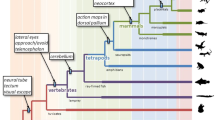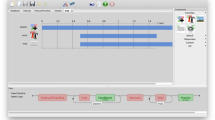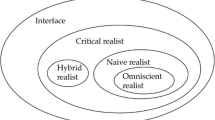Abstract
“Oscar” is going to be the first artificial person — at any rate, he is going to be the first artificial person to be built in Tucson's Philosophy Department. Oscar's creator, John Pollock, maintains that once Oscar is complete he “will experience qualia, will be self-conscious, will have desires, fears, intentions, and a full range of mental states” (Pollock 1989, pp. ix–x). In this paper I focus on what seems to me to be the most problematical of these claims, viz., that Oscar will experience qualia. I argue that we have not been given sufficient reasons to believe this bold claim. I doubt that Oscar will enjoy qualitative conscious phenomena and I maintain that it will be like nothing to be Oscar.
Similar content being viewed by others
References
Armstrong, David M.: 1966, ‘The Nature of Mind’, Arts (Proceedings of the Sydney University Arts Association) 3(1), 37–48 (reprinted in Armstrong, 1980, pp. 1–15).
Armstrong, David M.: 1968, A Materialist Theory of Mind, Routledge & Kegan Paul, London.
Armstrong, David M.: 1980, The Nature of Mind, Harvester Press, Brighton, Sussex.
Block, Ned: 1978, ‘Troubles With Functionalism’, in Wade C. Savage (ed.), Perception and Cognition. Issues in the Foundation of Psychology. Minnesota Studies in the Philosophy of Science, Vol. 9, (reprinted in Block, 1980, pp. 268–305). Page references to this reprinting.
Block, Ned (ed.): 1980, Readings in Philosophy of Psychology, Vol. 1, Harvard University Press, Cambridge MA.
Chisholm, R. M.: 1983, ‘Believing as an Intentional Concept’, in Parret, 1983, pp. 48–56.
Churchland, Patricia S.: 1983, ‘Consciousness: The Transmutation of a Concept’, Pacific Philosophical Quarterly 64, 80–95.
Churchland, Paul: 1979, Scientific Realism and the Plasticity of Mind, Cambridge University Press, Cambridge.
Cummins, Robert: 1984, ‘The Mind of the Matter’, PSA 2, 791–98.
Davidson, R. J., G. E. Schwarz and D. Shapiro (eds.): 1983, Consciousness and Self-Regulation, Vol. 3, Plenum Publishing Corporation, New York.
Dennett, Daniel C.: 1987, ‘Consciousness’, in Gregory, 1987, pp. 160–64s.
Dennett, Daniel C.: 1988, ‘Quining Qualia’, in Marcel and Bisiach, 1988, pp. 47–77.
Gregory, Richard (ed.): 1987, The Oxford Companion to the Mind, Oxford University Press, Oxford.
Gunderson, Keith: 1985, Mentality and Machines, 2d edn., University of Minnesota Press, Minneapolis.
Haugeland, John (ed.): 1981a, Mind Design. Philosophy, Psychology, Artificial Intelligence MIT Press: A Bradford Book, cambridge MA.
Haugeland, John: 1981a, ‘Semantic Engines’, in Haugeland, 1981, pp. 1–34.
Humphrey, Nicholas: 1972, ‘Seeing and Nothingness’, New Scientist 30 (March), 682–84.
Humphrey, Nicholas: 1974, ‘Vision in a Monkey without Striate Cortex: a Case Study’, Perception 3, 241–55.
Humphrey, Nicholas: 1984, Consciousness Regained, Oxford University Press, Oxford.
Humphrey, Nicholas and L. Weiskrantz: 1967, ‘Vision in Monkeys after Removal of the Striate Cortex’, Nature 215 (August 5), 595–97.
Kihlstrom, John F.: 1987, ‘The Cognitive Unconscious’, Science 237 (18 September), 1445–52.
Kneale, William: 1969, ‘Review of Armstrong's A Materialist Theory of Mind’, Mind 78, 292–301.
Lycan, William G.: 1987, Consciousness, MIT Press: A Bradford Book, Cambridge MA.
Marcel, A. and E. Bisiach (eds.): 1988, Consciousness in Contemporary Science, Oxford University Press, Oxford.
Maudlin, Tim: 1989, ‘Computation and Consciousness’, The Journal of Philosophy 86, 407–32.
McGinn, Colin: 1989, ‘Can We Solve the Mind-Body Problem?’, Mind 98, 349–66.
Nagel, Thomas: 1974, ‘What Is It Like to Be a Bat?’, The Philosophical Review 83, 435–50 (reprinted in Nagel, 1979, pp. 165–80).
Nagel, Thomas: 1979, Mortal Questions, Cambridge University Press, Cambridge.
Natsoulas, Thomas: 1982, ‘Conscious Perception and the Paradox of “Blind Sight”’, in Underwood, 1982, pp. 79–109.
Parret, H. (ed.): 1983, On Believing, DeGruyter, Berlin.
Pollock, John L.: 1989, How to Build a Person. A Prolegomenon, MIT Press: A Bradford Book, Cambridge MA.
Rey, Georges: 1983, ‘A Reason for Doubting the Existence of Consciousness’, in Davidson, Schwarz and Shapiro, 1983, pp. 1–39.
Underwood, Geoffrey (ed.): 1982, Aspects of Consciousness, Vol. 3, Academic Press, London.
Weiskrantz, L.: 1980, ‘Varieties of Residual Experience’, Quarterly Journal of Experimental Psychology 32, 365–86.
Weiskrantz, L.: 1986, Blindsight. A Case Study, Oxford University Press, Oxford.
Zihl, Josef: 1980, ‘“Blindsight”: Improvement of Visually guided Eye Movements by Systematic Practice in Patients with Cerebral Blindness’, Neuropsychologia 18, 71–77.
Author information
Authors and Affiliations
Rights and permissions
About this article
Cite this article
Stubenberg, L. What is it like to be Oscar?. Synthese 90, 1–26 (1992). https://doi.org/10.1007/BF00485190
Issue Date:
DOI: https://doi.org/10.1007/BF00485190




